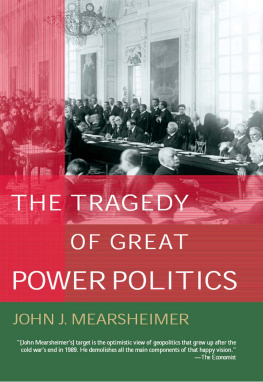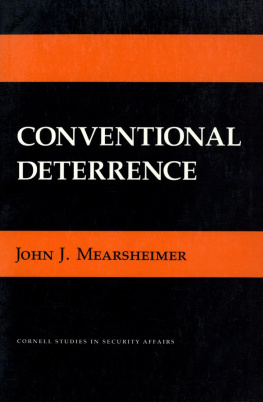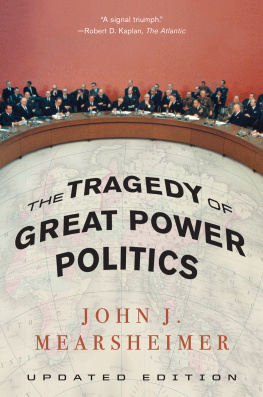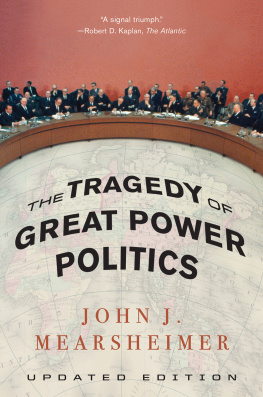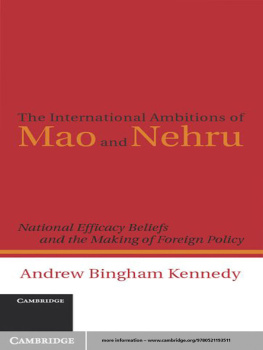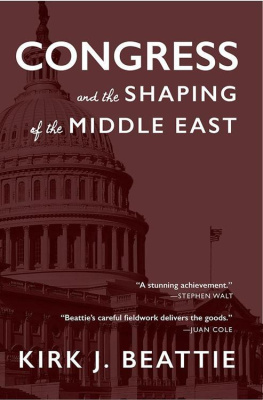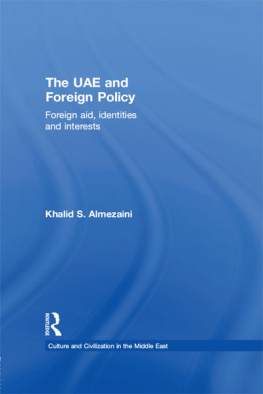WHY LEADERS LIE
WHY LEADERS LIE
The Truth about Lying in
International Politics
JOHN J. MEARSHEIMER


Oxford University Press, Inc., publishes works that further
Oxford Universitys objective of excellence
in research, scholarship, and education.
Oxford New York
Auckland Cape Town Dar es Salaam Hong Kong Karachi
Kuala Lumpur Madrid Melbourne Mexico City Nairobi
New Delhi Shanghai Taipei Toronto
With offices in
Argentina Austria Brazil Chile Czech Republic France Greece
Guatemala Hungary Italy Japan Poland Portugal Singapore
South Korea Switzerland Thailand Turkey Ukraine Vietnam
Copyright 2011 by John J. Mearsheimer
Published by Oxford University Press, Inc.
198 Madison Avenue, New York, New York 10016
www.oup.com
Oxford is a registered trademark of Oxford University Press
All rights reserved. No part of this publication may be reproduced,
stored in a retrieval system, or transmitted, in any form or by any means,
electronic, mechanical, photocopying, recording, or otherwise,
without the prior permission of Oxford University Press.
Library of Congress Cataloging-in-Publication Data
Mearsheimer, John J.
Why leaders lie : the truth about lying in international politics /
John J. Mearsheimer.
p. cm.
Includes bibliographical references and index.
ISBN-13: 978-0-19-975873-9 (hardcover : alk. paper)
ISBN-10: 0-19-975873-5
1. International relationsMoral and ethical aspects. 2. Truthfulness and
falsehoodPolitical aspects. 3. Political ethics. I. Title.
JZ1306.M43 2011
172.4dc22 2010013552
9 8 7 6 5 4 3 2 1
Printed in the United States of America on acid-free paper
Contents
CHAPTER 1
What is Lying?
CHAPTER 2
The Inventory of International Lies
CHAPTER 3
Lying between States
CHAPTER 4
Fearmongering
CHAPTER 5
Strategic Cover-ups
CHAPTER 6
Nationalist Myths
CHAPTER 7
Liberal Lies
CHAPTER 8
The Downside of Telling International Lies
CHAPTER 9
Conclusion
Preface
In the spring of 2003, Serge Schmemann of the New York Times called me out of the blue and said that he was working on a piece about lying in international politics for the Sunday papers Week in Review section. He said that for some reason my name popped into his head, so he decided to call me. We had not met or talked before. I told him that I had never thought about the subject and I did not think there was much, if any, scholarly literature on international lying. I told him that he should tell me what he was thinking and I would react. We did just that and had what I thought was an interesting and fruitful discussion that lasted about an hour. Afterward, I wrote up some brief notes on the conversation and filed them away.
A few months later, in September 2003, I was invited to give a talk at MIT on a topic of my choosing. I thought it would be interesting to talk about lying in international politics, so I pulled up my notes from my conversation with Schmemann and crafted a talk for the occasion. Over the next six years, I wrote a paper, gave eight more talks, and had numerous conversations with friends and colleagues about this subject.
Throughout this process, I have been struck by the way people respond to the topic of international lying. Every audience and almost every person I have spoken to quickly becomes engaged and excited by the subject, and many want to talk at length about it. A number have sent me follow-up emails on their own initiative, including people who I have never met, but who were in the audience at one of my talks.
I can think of several reasons why this subject generates so much interest. For starters, most people consider lying to be a reprobate form of behavior, at least when you first broach the subject. Nearly everyone would recoil at being called a liar, even if they occasionally tell a lie themselves. Indeed, it is such a serious charge that people sometimes hesitate to call someone a liar even when they think the charge applies; instead they employ softer language. Senator John Kerry (D-MA), for example, was loath to call President Bush a liar during the 2004 presidential campaign and instead said that he failed to tell the truth about Iraq and misled the American people. However, the fact that lying is widely perceived to be wicked behavior is one reason that people like to talk about the subject. It gets the juices flowing.
What seems to make the subject even more interesting to many is that I argue that there are sometimes good strategic reasons for leaders to lie to other countries as well as to their own people. International lying, in other words, is not necessarily misconduct; in fact, it is often thought to be clever, necessary, and maybe even virtuous in some circumstances.
Yet no argument I make is more controversial and generates more discussion than my claim that statesmen and diplomats do not lie to each other very often. Hardly anyone seems to believe this is trueat least when they first hear it. Most people are surprisingly cynical on this issue. They seem to believe that there are countless examples where leaders around the world lied to each other and that therefore it should be easy to come up with a long list of those kinds of lies. In essence, they believe that inter-state lying is business as usual in international politics. I tell my interlocutors that as a card-carrying realist I was inclined at first to agree with them, but after studying the matter I have come to believe they are wrong. There is just not that much inter-state lying. Of course, this is not to say there is none.
The subject also resonates because of the Iraq war. Many well-informed people now believe that the Bush administration lied to the American people in the run-up to that conflict, which has turned into a strategic disaster for the United States. When a war goes badly and the public believes that deception helped make the war possible in the first place, people invariably get very interested in talking about why leaders would lie to their own citizens and what the likely consequences are. Plus the fact that there is hardly any literature on lying in international politics allowsor even compelspeople to think creatively about these matters.
Given the dearth of literature on international lying and what seems to be a significant interest in the subject, I decided to turn my unpublished paper on lying into a book. My main aim was to provide some analytical frameworks that might help organize how we think about lying in international politics, as well as some theoretical claims about key aspects of that subject. I hope this book will be a conversation starter on an important topic that hitherto has received scant attention. If I am successful, others will follow in my footsteps and refine and challenge my arguments.
My thinking about lying has been markedly influenced by feedback from the audiences at the various places where I have spoken: the Council on Foreign Relations in New York; the Saltzman Institute of War and Peace Studies at Columbia University; the 2004 annual meeting of the American Political Science Association; a faculty-student seminar at the University of Montana; the Browne Center for International Politics at the University of Pennsylvania; the MIT Political Science Department; the University of Chicagos Program on International Security Policy; the Lone Star National Security Forum; and the North-South workshop jointly run by the internationalrelations faculties of Northwestern University and the University of Chicago.
Next page

